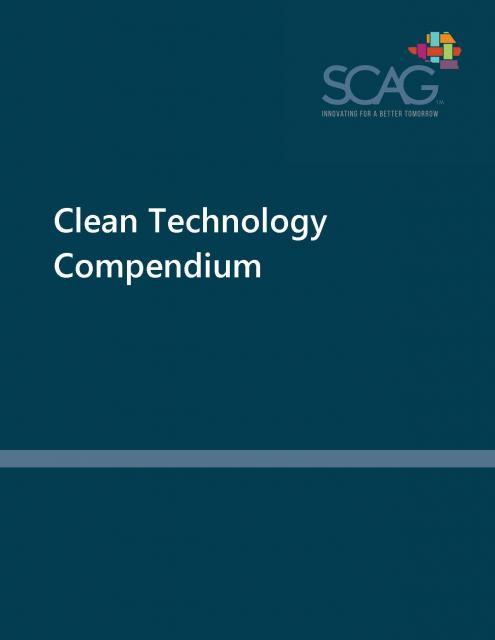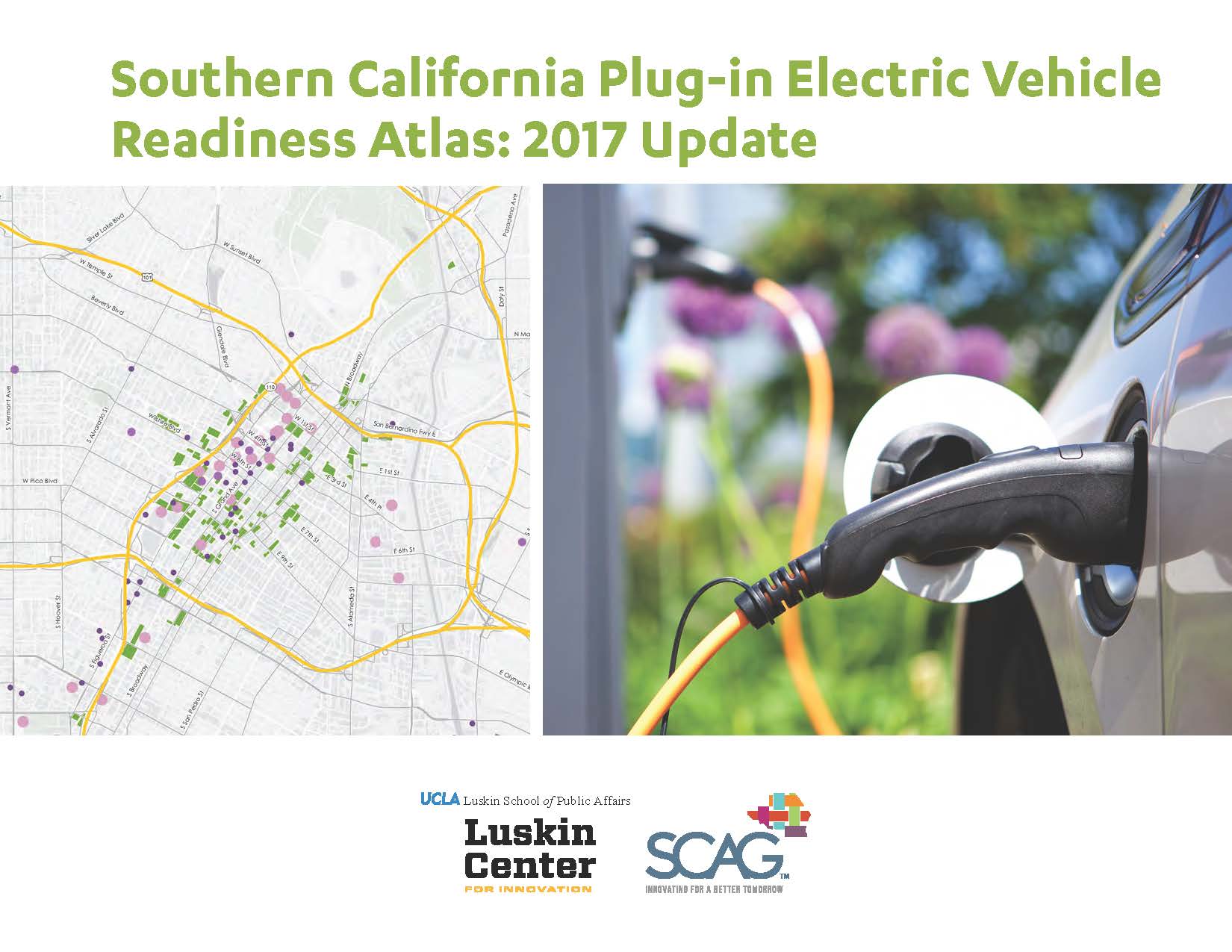Clean Cities Coalition

The Southern California Clean Cities Coalition is a U.S. Department of Energy (U.S. DOE) designated coalition in the Clean Cities and Communities partnership. The mission of the U.S. DOE’s Clean Cities and Communities partnership is to advance the nation’s economic, environmental, and energy security by supporting local decisions to adopt practices that reduce petroleum consumption.
The Southern California Clean Cities Coalition coordinates activities of both private and public sector proponents of alternative fuel vehicles by providing a forum to discover commonalties, collaborate on public policy, investigate opportunities for joint projects, leverage scarce resources, and cooperate on promoting the benefits of alternative fuel vehicles throughout the region.
The Southern California Clean Cities Coalition was first designated by the U.S. DOE on March 1, 1996. In 2010, SCAG resumed direct administrative responsibility for the Southern California Clean Cities Program.
The Southern California Clean Cities Coalition prepares several quarterly and annual reports related to alternative fuels and vehicles pursuant to their cooperative agreement with the U.S. DOE, referred to as the Statement of Project Objectives. The annual progress report acts as an important indicator of the coalition’s impact and includes voluntary data from stakeholders about the volume of alternative fuels used, the number of alternative fuel vehicles (AFVs), including electric vehicles (EVs) and hybrid EVs, idle reduction initiatives, fuel economy improvements and programs to reduce vehicle miles traveled. The annual vehicle and station cost tracking and reporting collects cost information for AFVs and stations within the SCAG region, while the annual alternative fueling station report assists the U.S. DOE with updating the alternative fueling station database.
Alternative Fuels & Vehicles
SCAG has a history of successful initiatives, collaborations, and achievements related to alternative fuels and vehicles. The promotion of alternative fuel vehicles and their necessary infrastructure is a critical strategy for reducing greenhouse gases in the SCAG region, a key focus outlined in the Connect SoCal 2024 Regional Transportation Plan/Sustainable Communities Strategy. Furthermore, on April 6, 2023, SCAG’s Regional Council passed Resolution No. 23-654-5, which established SCAG’s Clean Transportation Technology Policy. This policy creates a structured approach for SCAG to foster the growth, commercialization, and implementation of a transportation system that is either zero or near zero emission.
Southern California Plug-In Electric Vehicle Atlas
The Southern California Plug-in Electric Vehicle (PEV) Atlas includes maps, charts and data at the subregional level, to illustrate factors that influence demand for charging equipment at specific locations. It contains 198 pages of maps, charts and data at the subregional and council of government-level that illustrate factors influencing demand for charging equipment at specific locations.
The interactive PEV Atlas provides useful data in a visual context, such as locations of existing charging stations and employers as well as a suite of spatial tools for PEV readiness planning for the following councils of government:
- Arroyo Verdugo Subregion
- City of Los Angeles
- Coachella Valley Association of Governments
- Gateway Cities Council of Governments
- Imperial County Transportation Commission
- Las Virgenes Malibu Council of Governments
- North Los Angeles County
- Orange County Council of Governments
- San Bernardino Associated Governments
- San Fernando Valley Council of Governments
- San Gabriel Valley Council of Governments
- South Bay Cities Council of Governments
- Ventura County Council of Governments
- Western Riverside Council of Governments
- Westside Cities Council of Governments
Clean Technology Compendium
 Resolution No. 23-654-5 established SCAG’s Clean Transportation Technology Policy and mandated the creation of a “Clean Technology Compendium.” This compendium, which supported development of the Connect SoCal 2024 Regional Transportation Plan/Sustainable Communities Strategy, offers an in-depth look at zero- and near-zero emission transportation technologies, including charging and fueling infrastructure and other supporting products. It covers a range of sectors, such as passenger, medium- and heavy-duty vehicles, transit, and rail. The document highlights essential features, identifies knowledge gaps, and suggests strategies for the deployment of clean technologies in the regions.
Resolution No. 23-654-5 established SCAG’s Clean Transportation Technology Policy and mandated the creation of a “Clean Technology Compendium.” This compendium, which supported development of the Connect SoCal 2024 Regional Transportation Plan/Sustainable Communities Strategy, offers an in-depth look at zero- and near-zero emission transportation technologies, including charging and fueling infrastructure and other supporting products. It covers a range of sectors, such as passenger, medium- and heavy-duty vehicles, transit, and rail. The document highlights essential features, identifies knowledge gaps, and suggests strategies for the deployment of clean technologies in the regions.
The compendium is a resource for public agencies and local governments in formulating policies that encourage the adoption of these technologies, providing stakeholders with information necessary to make decisions that align with sustainability objectives.
Read the Clean Technology Compendium Factsheet.
Southern California Electric Vehicle Charging Station Study
The SCAG “Southern California Electric Vehicle Charging Station Study” was completed in February 2023. SCAG partnered with 18 cities within the SCAG region to help jurisdictions promote development and deployment of electric vehicle (EV) charging infrastructure to accelerate transportation electrification.
The study included tailored policy guidance to study partner cities; a regionwide site suitability analysis to target areas for future EV charging infrastructure, with a focus on increasing EV infrastructure in traditionally underserved and hard-to-reach communities including multi-unit dwellings and disadvantaged communities, EV site evaluations, and a Passenger Electric Vehicle Infrastructure Plan that informs on the need and tools available for cities to spur development of charging stations and support EV adoption across Southern California.
Study products and tools are available below to assist your community with electric vehicle charging infrastructure planning, and you may view, download and share our informational brochure with your constituents.
- Resources
- 2023 EV Funding Guide
- EV Charging Station Survey
- EV Planning Guide for Cities
- EV Planning Guide for Property Managers
- EV Policy Memo Example – City of Covina
- EV Policy Memo Template for Cities
- EV Study Virtual Meeting Room
- PEV Site Suitability Scoring Methodology Report
- Regional Passenger Electric Vehicle (PEV) Infrastructure Plan and Final Report
- Toolbox Tuesday Recording (Dec. 2022)
- Toolbox Tuesday Slidedeck (Dec. 2022)
- Site Plan Examples: City of Glendora
- Site Plan Template
AI-Based Mobility Monitoring System & Analytics Demonstration Project Using Electric Vehicles
SCAG is partnered with the HORIBA Institute for Mobility and Connectivity2 (HIMaC2) at the University of California, Irvine, to research artificial intelligence (AI) and transportation energy efficiency in the city of Irvine. As part of this effort, two listening sessions in April 2023 and November 2024 presented results from research into uses of AI to improve safety and energy efficiency for transportation systems.
The Vehicle Technology Office of the U.S. Department of Energy awarded HIMaC2 with grant funding to research the use of AI for transportation systems. HIMaC2 researchers are collecting and analyzing anonymous traffic data at 25 intersections in Irvine to inform driving suggestions that improve air quality, traffic, energy efficiency, and safety. Simulations of this network will be modeled at the University of California, Irvine, Controlled Simulation Laboratory Platform and the Argonne National Laboratory to demonstrate how AI tools can operate at various scales to improve energy efficiency.
For general inquiries about the project, contact Blake Lane, Ph.D., at bal@apep.uci.edu and Marisa Laderach, Principal Regional Planner, at laderach@scag.ca.gov.
Please review the fact sheet for more information about this project.
Southern California Electric Vehicle Infrastructure Readiness Initiative

The Southern California Electric Vehicle Infrastructure Readiness Initiative developed a regional Plug-in Electric Vehicle (PEV) Readiness Plan, with complementary model subregional plans that advance strategies for the accelerated and streamlined deployment of PEV electric vehicle supply equipment (EVSE). Additionally, the program established best practices for EV-ready building and public works guidelines, and helped streamline PEV EVSE permitting, installation and inspection processes. This plan is part of a larger push to establish support for the growth in PEV usage throughout California while promoting economic development within the green technology sector. The PEV Readiness Plan is available online.
- Resources
- PEV Readiness Plan - Introduction to PEVs
- PEV Readiness Plan - Chapters for Employers
- PEV Readiness Plan - Chapters for Building and Retail Owners
- PEV Readiness Plan - Chapters with Model Zoning and Building Codes
- PEV Readiness Plan - Chapters for Public Sector Planners
- SCAG PEV Readiness Plan Document
- South Bay Cities Subregional PEV Deployment Plan
- Western Riverside Subregional PEV Deployment Plan
Resources
Find links to Clean Cities partners and federal and state government agencies, as well as links to agencies and institutions in energy, transportation, and academia.
- Regional Clean Cities Coalitions
- U.S. Department of Energy
- ARPA-E Funded Projects
- Alternative Fuels & Advanced Vehicles Data Center
- Alternative Fuels Station Locator Tool
- BBI International
- California Fuel Cell Partnership
- Clean Cities Newsletters
- Energy Information Administration (EIA) Renewables Page
- EPA/DOT – “State and Local Transportation Resources”
- Federal Energy Management Program
- Federal Transit Administration
- Find a Car
- Fuel Economy
- Idaho National Laboratory
- Link to Clean Cities Coordinators
- National Corn Growers Association
- National Corn-to-Ethanol Research Center
- National Renewable Energy Laboratory
- Surface Transportation Policy Project
- U.S. Department of Energy
- U.S. Environmental Protection Agency (EPA)
- State Agencies
- Energy and Transportation Organizations
- AC Propulsion – eBox
- Advanced Transit Association
- American Coalition for Ethanol
- American Gas Association (Linde)
- American Methanol Institute
- American Petroleum Institute
- American Public Transportation Association
- California Natural Gas Vehicle Partnership
- CalStart
- Clean Cities and Communities
- Clean Fuels Alliance America
- Center for Transportation and the Environment (Georgia)
- Donlen Corp
- E4 Mobility Alliance4 Mobility Alliance- Los Angeles Economic Development Corporation
- Electric Vehicle Association
- EV World
- Energy & Environmental Research Center
- Independent Petroleum Association of America
- Inform Inc.
- Fresh Energy
- Gas Technology Institute Energy
- National Association of Fleet Administrators, Inc.
- National Conference of State Legislatures
- National Propane Gas Association
- National Petroleum Council
- Natural Gas Vehicles for America
- Renewable Fuels Association
- Society of Automotive Engineers
- The Energy and Resources Institute
- Universities
- Other Resources
